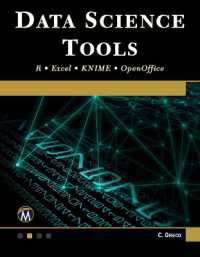- ホーム
- > 洋書
- > 英文書
- > Science / Mathematics
基本説明
研究テーマや研究室・指導教員の選びかた、研究計画の立てかた、研究倫理、口頭ならびに書面でのやり取りのしかた、論文発表、企画書の書きかた、研究所や企業への就職活動など、理系・文系を問わず、これから専門研究者としてやっていこうとしている院生やその院生を指導する教員のために書かれた具体的手引書。(2017/06/27)
A hands-on guide for graduate students and young researchers to perfect the practical skills needed for a successful research career. Topics include choosing a research topic, making a work plan, publishing papers, and planning a scientific career.
Full Description
This is a hands-on guide for graduate students and young researchers wishing to perfect the practical skills needed for a successful research career. By teaching junior scientists to develop effective research habits, the book helps to make the experience of graduate study a more efficient and rewarding one. The authors have taught a graduate course on the topics covered for many years, and provide a sample curriculum for instructors in graduate schools wanting to teach a similar course. Topics covered include choosing a research topic, department, and advisor; making workplans; the ethics of research; using scientific literature; perfecting oral and written communication; publishing papers; writing proposals; managing time effectively; and planning a scientific career and applying for jobs in research and industry. The wealth of advice is invaluable to students, junior researchers and mentors in all fields of science, engineering, and the humanities. The authors have taught a graduate course on the topics covered for many years, and provide a sample curriculum for instructors in graduate schools wanting to teach a similar course. The sample curriculum is available in the book as Appendix B, and as an online resource.
Contents
1. Introduction; 2. What is science?; 3. Choices, choices, choices; 4. The adviser and thesis committee; 5. Questions drive research; 6. Giving direction to your work; 7. Turning challenges into opportunities; 8. Ethics of research; 9. Using the scientific literature; 10. Communication; 11. Publishing a paper; 12. Time management; 13. Writing proposals; 14. The scientific career; 15. Applying for a job; 16. Concluding remarks; Appendix A. Further reading; Appendix B. A sample curriculum; Appendix C. The Refer and BibTeX format; Index.







